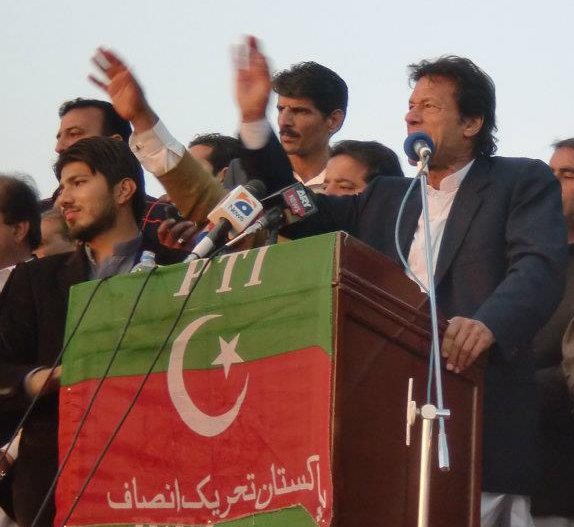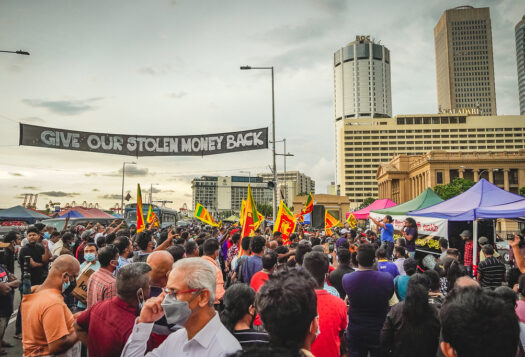
On June 26, Pakistan’s powerful army dismissed three senior officers and took disciplinary action against another 15 military personnel for failing “to maintain security and sanctity of the garrisons and Jinnah House” after protestors stormed various military installations in response to the arrest of former Prime Minister Imran Khan on May 9. These actions, in an unprecedented move against the Army’s own members, are also aimed at ones who are were assumed to be sympathetic towards Imran Khan.
Since the May 9 protests which broke out across Pakistan following the arrest of Imran Khan from the Lahore High Court (LHC) premises, the manifold tactics deployed by the country’s powerful military, with complete support of the ruling government, to clip the wings of the country’s most popular leader and his party, Pakistan Tehreek-e-Insaf (PTI), are on full display.
While the Army cites national security concerns to justify these tactics, the systematic dismantling of Imran Khan and his party points towards a broader scheme to crackdown on any threat to the establishment and the ruling alliance.
On July 12, the Pakistan National Assembly passed a resolution demanding that the people involved in May 9 protests “should be punished under the Army Act 1952 without delay.” Prior to this, the Army had come down hard on the protestors in the 81th Formation Commanders Conference on June 7, demanding strict legal actions against those involved in the protests, apart from holding the ones accused to have attacked military installations accountable in the military courts.
While the Army cites national security concerns to justify these tactics, the systematic dismantling of Imran Khan and his party points towards a broader scheme to crackdown on any threat to the establishment and the ruling alliance.
Targeting Imran Khan
Imran Khan and the PTI became the target of the country’s powerful military after his continuous tirade against former Army Chief Gen. Qamar Bajwa, current Army Chief Gen. Asim Munir, and other senior officers. Imran Khan publicly and insistently criticized the senior military officials for standing with his political opponents, who Khan argues are corrupt and responsible for the miseries of the people of the country. Until the souring of ties, Khan himself enjoyed the Army’s support, including in the 2018 elections which brought him to power, until tussles between Khan and the Army culminated in his ouster as the premier last year.
While Khan has accused the Army of conspiring against him, the military establishment had gone on the defensive, arguably because of the popularity of Khan. The military tried to defuse Khan’s allegations by providing responses and counter allegations against him. However, the failure of the ruling Pakistan Democratic Movement (PDM) alliance to stabilize the economy has only strengthened Khan’s popularity and weakened the establishment’s position.
The fallout between Khan and the Army on domestic policy, some aspects of foreign policy, and the lead up to his ouster brought the establishment and the PDM together. The challenge for the latter has been to ward off allegations, criticism, and threat of the most popular politician in the country. The May 9 protests in various parts of the country and the attacks on some military installations by some protestors provided the fortuitous chance for the establishment to unleash a range of harsh measures, including filing sedition charges and using military trials against Imran Khan and his supporters. These measures are meant to take the wind out of Imran’s sails and put it in the Army’s sails. In this process, journalists and human right activists have also become victims of this punishing policy against the opponents and critiques of the Army.

The protests as “emergency”
The punitive policy of the establishment and the government against the protestors in the aftermath of the May protests has led to a situation in Pakistan in which the common citizen has been denied access to the courts and justice. The protests and the subsequent situation have thus been converted into a “state of exception” by the establishment.
In a “state of exception,” normally-guaranteed rights are suspended in the wake of a forged and fictitious emergency, and military powers are exercised or extended to regain control. The situation that is unfolding in Pakistan after the May 9 incidents is a reminder of how the Pakistan Army produces “the state of exception” to muffle the voices that criticize it for interfering in the country’s politics or against a formidable political force that potentially may undermine its influence. While the military more often uses quiet tactics, aided by politicians’ desire for military support, the events following Imran Khan’s arrest show that the military is willing and able to employ brute tactics when necessary.
Using the language of emergency further lends legitimacy to military actions. For example, as the Corps Commanders House in Lahore took fire, the building suddenly became the Jinnah House to invoke its political significance. The house of the founding father of Pakistan was attacked by the supporters of Imran Khan, portraying them as attackers of the state. Earlier, the house was hardly attributed to Jinnah, let alone to his legacy. It has been used and called ‘Corps Commanders House’ for decades.
Justifying clampdown
Unlike other protests, like in 2021 when the Tehreek-e-Labbaik Pakistan (TLP) demanded that the French ambassador be thrown out from Pakistan, the May 9 protests have been leveraged by the Army to achieve its political agenda. In the weeks since the protests, the Army argued that the events on May 9 were an attack on the state, not a form of criticism against the establishment for its alleged interference in politics or of the government for its failures to govern the country. According to this narrative, the most popular leader of the country, irrespective of his egoistic personality, is an enemy of the state requiring military intervention.
Imran Khan and his party had enjoyed the support of the establishment just a few years ago. To pave the way for Khan to become the Prime Minister of the country, the same establishment had orchestrated the ouster of then Prime Minister Nawaz Sharif on a flimsy argument that he did not have the characteristics of the Prophet Muhammad: Sadiq and Amin (honest and righteous). The establishment has now changed the side with those parties that blamed it for “selecting” Khan by rigging the 2018 elections in his favor. The PDM and Khan both seek the support of the establishment to remain in power, demonstrating the significance of its role in the country’s politics.
Army’s victory
The Army in Pakistan has deeply invested in the existing order in the country. It would not like it to be disturbed, from outside or within the establishment. Imran, in the wake of his popularity, tried to challenge that order of the Pakistani polity by openly criticizing the role of the establishment with hope that the latter would withdraw its support from the ruling PDM alliance and facilitate elections in the country.
The situation that is unfolding in Pakistan after the May 9 incidents is a reminder of how the Pakistan Army produces “a state of exception” to muffle the voices that criticize it for interfering in the country’s politics.
Since the parliament, judiciary, and even civil society have failed to restore a semblance of political stability in the country, the establishment has filled the vacuum and re-imposed its dominance. The measures and actions that are being taken against Imran and his supporters suit the Army’s interests as it was facing credibility issues. Lately, the Army was not able to hold its rank and files together. It also has not been able to defeat terrorism in the country for 20 long years. It faces flack for its failures in Afghanistan as well and is not liked in Khyber-Pakhtunkhwa (KP) and Balochistan either.
The May incidents are being artfully converted by the Army into an “exception” for the purpose to reclaim its space in the country’s politics. The Army will be careful in the future to not let the situation reach a possible tipping point, like it had in Khan’s case, where it will be openly criticized for its interference in the country’s politics.
Also Read: SAV Q&A with Cyril Almeida – Imran Khan’s Arrest and Implications for Pakistan’s Future
***
Image 1: Imran Khan via Wikimedia Commons
Image 2: Imran Khan PTI via Wikimedia Commons


